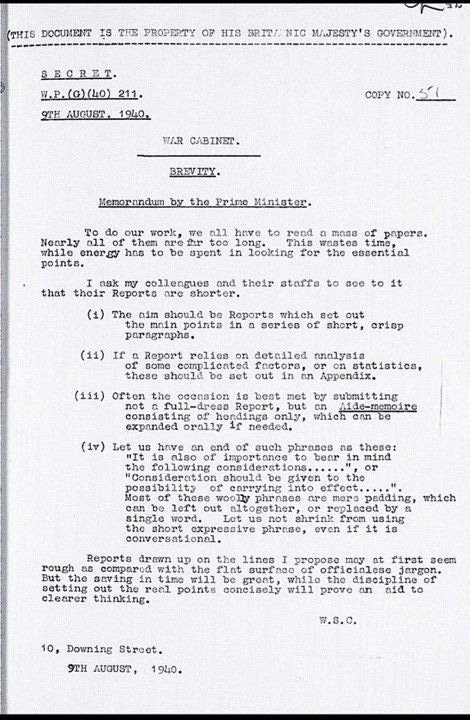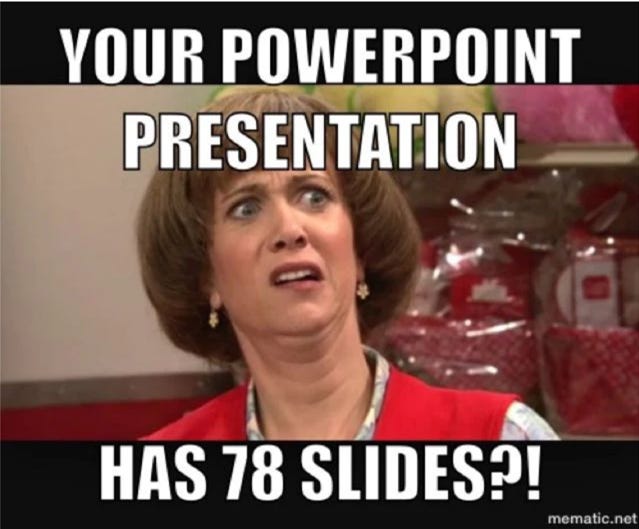A lesson for consultants in Brevity, from Churchill
Churchill's 4 rules for clear communication, and why they matter for consultants
"To do our work, we all have to read a mass of papers. Nearly all of them are far too long." - Winston Churchill
I'm reading a fascinating book, The Splendid & The Vile by Erik Larson. It's a detailed and well-written account of the Second World War that centres on Churchill.
The start of Chapter 28 really jumped out at me. I wasn't expecting to see much in the book that was relevant to consulting!
If you get frustrated at reading reports that aren't written clearly, that don't get to the point, that don't tell you the "so-what" - you're in good company. Churchill was frustrated too.
Churchill's 4 rules
Churchill was well known as a great orator. He also spent hours reading vast numbers of reports from his many advisors and colleagues.
It was taking him too long to read everything he needed to. He wanted to be across all the detail but the length and writing style of these reports was getting in the way. He couldn't efficiently access the information he needed to know.
He couldn't make decisions fast enough.
Churchill being Churchill, he wasn't going to stand for this for long. On August 9th, 1940 he wrote a note, titled "BREVITY", with 4 rules for better writing:
To summarise Churchill's points:
Set-out the main points in a series of short, crisp paragraphs
Place detailed analysis in an appendix
Consider just an aide-mémoire with headings only
Remove cumbersome prose
His goal was to save time, but he also believed "the discipline of setting out the real points concisely will prove an aid to clearer thinking".
How true that is. Writing a shorter note, to paraphrase Blaise Pascal, takes time. That is because it takes time to think clearly about the key points and summarise them well.
What does this mean for consultants?
Churchill wrote BREVITY 45 years before Barbara Minto first published The Pyramid Principle in 1985.
Powerpoint hadn't been invented then but I suspect the memes would have resonated with them both...
Unfortunately the advice is still needed today. If anything, Powerpoint and Word have made it worse.
These days it's easy to produce reports. Computers have removed a lot of the barriers. AI tools will accelerate that further.
Everyone needs to write, and consultants in particular are expected to produce reports faster than ever. Writing has become a critical but under-developed skill. While producing some kind of report is easy a well-written report that is crystal clear is still comparatively rare.
One useful concept I saw more recently was in the excellent book storytelling with data by Cole Nussbaumer Knaflic. She makes a distinction between Exploring data and Explaining data.
When you're in a mindset of Exploring, you talk about the journey. You share everything you've discovered. You are enjoying the data for the sake of the data. There is a point, often early in a project, where that mindset is important.
When you're in a mindset of Explaining, you are helping others make decisions. You are focused on the questions they have, and what actions they can take.
As a consultant communicating with clients you almost always want to be in the Explaining mode. That's how you can help them take decisions.
With that, and Churchill's 4 rules, you would:
Write a clear summary that explains the key points they need to understand
Expand on each with a series of short, crisp paragraphs (or a powerful chart)
Place detailed analysis in an appendix
Reduce word count and eliminate cumbersome prose
If you can do those things you'll explain more clearly and your clients will get your points faster. The end result will be faster, more confident, decisions.
And that can be the difference between winning and losing.
Thanks for reading! There are several other ways you can interact with us….
Connect with Deri Hughes on LinkedIn
Connect with Colin Mann on LinkedIn
Book a 30 minute intro call with Deri Hughes
Stay informed about our free workshops and webinars - follow Honeycomb on LinkedIn or visit our website.






